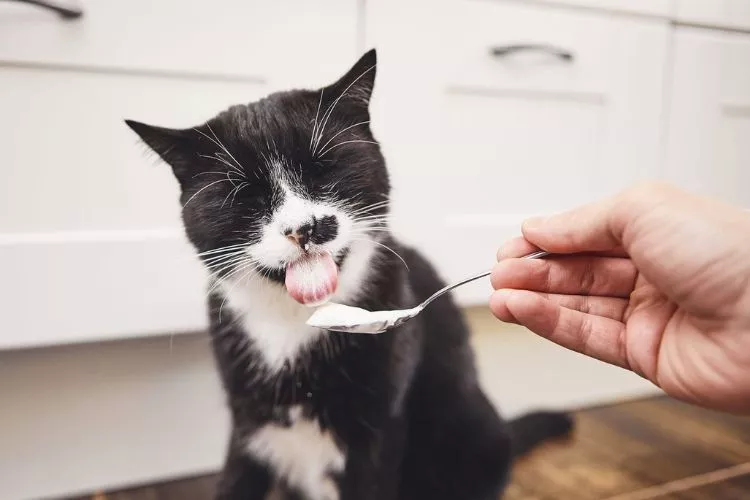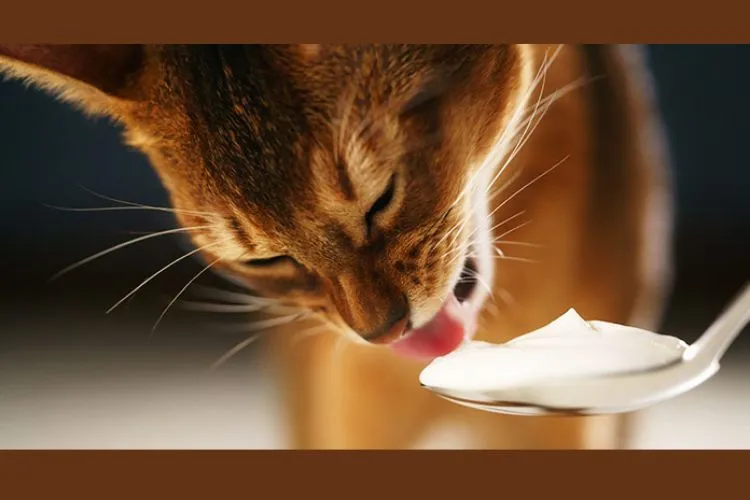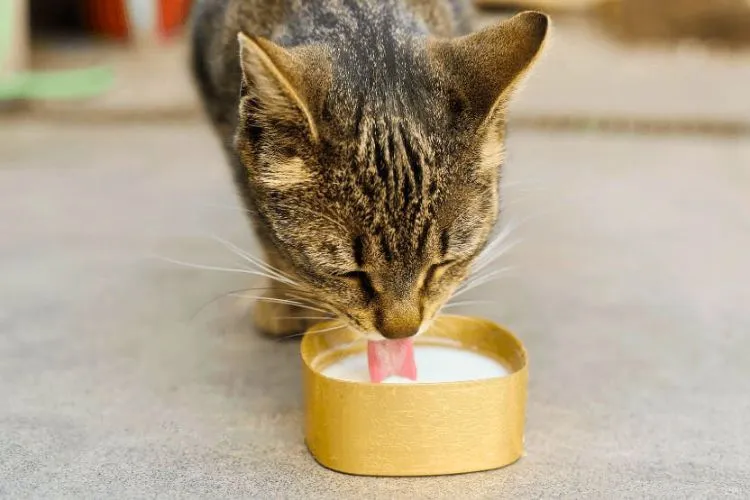When it comes to the diets of our feline companions, a common question from many cat parents is ‘can cats eat yogurt?’
While humans relish this creamy dairy delight, it may not necessarily be the perfect treat for our furry friends.
In this article, we are diving deep into this topic, providing scientific facts, veterinary insights, and practical advice to help you determine if yogurt is safe for your finicky feline.

We’ll explore different types of yogurt, potential benefits and risks, and tips on introducing this food to your cat’s diet, if it makes the perfect fit.
🐾 Can cats eat yogurt?
Yes, cats can eat yogurt, but only in moderation. Generally, small amounts of plain, unsweetened yogurt can be safe for most cats to consume.
Yogurt contains probiotics and nutrients that can be beneficial to digestive health.
However, it is essential to remember that cats are lactose intolerant, meaning their ability to digest dairy products diminishes as they age.
After consuming dairy, including yogurt, many cats may experience gastrointestinal issues, such as diarrhea or vomiting.
It’s important to avoid yogurt containing added sugar, artificial sweeteners, or flavors, as these ingredients can harm feline health.
As a cat owner, consult your veterinarian before introducing new food to your cat’s diet and closely monitor for any adverse reactions.
🐾 How much yogurt should I give my cat?
While it’s safe for cats to consume yogurt in moderation, as a general rule, yogurt should only be given in small amounts as an occasional treat.
None of the sources obtained from your search explicitly mentioned an exact quantity of yogurt for cats, and this is likely because the answer can depend on factors like a cat’s size, weight, age, and overall health condition.
To avoid any potential digestive discomfort to your cat due to lactose intolerance, it’s recommended to start with small spoonfuls and observe for any adverse reactions.
The yogurt must be plain, unsweetened, and free from artificial flavorings or sweeteners. It’s always safer to consult your veterinarian for appropriate serving sizes tailored to your cat’s needs.
🐾 Can cats eat yogurt everyday?
While cats may be able to consume yogurt, including it in their daily diet is not recommended. Yogurt should only be provided occasionally as a small treat.
Regular intake can lead to gastrointestinal issues due to the lactose in yogurt. Despite yogurt having beneficial probiotics and calcium, feeding cats with yogurt daily is not species-appropriate.

Moreover, it’s important to note that yogurt should be plain, unsweetened, and free from artificial flavorings. It’s always best to consult a veterinarian before introducing new foods into your cat’s diet.
🐾 Can cats eat greek yogurt?
Yes, cats can eat Greek yogurt in small quantities, but it should not be a regular part of their diet. Like regular yogurt, Greek yogurt can provide probiotics that may benefit feline digestive health.
It’s even considered a better option than regular yogurt as it normally contains less lactose due to the straining process in its production which can be more tolerable for some cats.
However, similar caution should be taken given that cats are typically lactose-intolerant.
Greek yogurt given to cats should always be plain, free from added sugar or artificial flavorings unsuitable for feline consumption.
It’s still important to consult your vet before introducing Greek yogurt into your cat’s diet, and monitor for potential adverse reactions.
🐾 Can cats eat vanilla greek yogurt?
No, it is not recommended to feed cats vanilla Greek yogurt. While Greek yogurt can be relatively safe in small amounts for cats, vanilla flavoring is a concern.
Most vanilla Greek yogurts contain sugar and other sweeteners, which are not suitable for cats.
Excessive sugar consumption can lead to health issues such as obesity and diabetes. Furthermore, while vanilla extract isn’t listed as toxic to cats, it does contain a small amount of alcohol, which is harmful to cats.
Always consult a vet before introducing a new food into your cat’s diet.
🐾 Can cats eat flavored yogurt?
No, cats should not eat flavored yogurt. According to the findings from various vet-approved sources, while plain and unsweetened yogurt can be safe for cats in moderation, flavored yogurt is not recommended.
Flavoring such as vanilla often introduces sugar and other sweeteners into the yogurt, which are unsuitable for feline consumption.

High sugar levels can lead to health issues such as obesity and diabetes in cats. Besides, some flavorings may contain artificial additives that could harm cats. Before introducing a new food into your cat’s diet, it’s important to consult with a veterinarian.
🐾 Is yogurt a laxative for cats?
While yogurt contains probiotics that can aid digestive health, it doesn’t directly indicate yogurt as a laxative for cats.
When cats are constipated, several safe laxative options are available that are specifically formulated for them.
However, if your cat is experiencing constipation, it’s always best to consult a veterinarian as this could indicate more serious health issues.
Similar Read: Can Cats Eat Carrots?
Conclusion :
In conclusion, cats can eat yogurt, but only in small amounts and as an occasional treat. Yogurt, specifically plain, unsweetened Greek yogurt, can provide probiotics for digestive health.
However, it should not become a regular part of your cat’s diet due to the potential for lactose intolerance and the high fat content often found in yogurt.
Flavored yogurts should be avoided, particularly those with added sugars or artificial sweeteners.
These additives can harm cats, potentially leading to obesity, diabetes, and other health problems.
It’s essential to remember that while cats can enjoy the occasional spoonful of plain, unsweetened yogurt, it does not replace a balanced, nutritionally complete cat food.
You should consult your vet whenever you’re considering adding something new to your cat’s menu.
So next time your furry friend pleads for a taste of your morning yogurt, you can let them have a little – just make sure it’s the right kind, and always in moderation.
